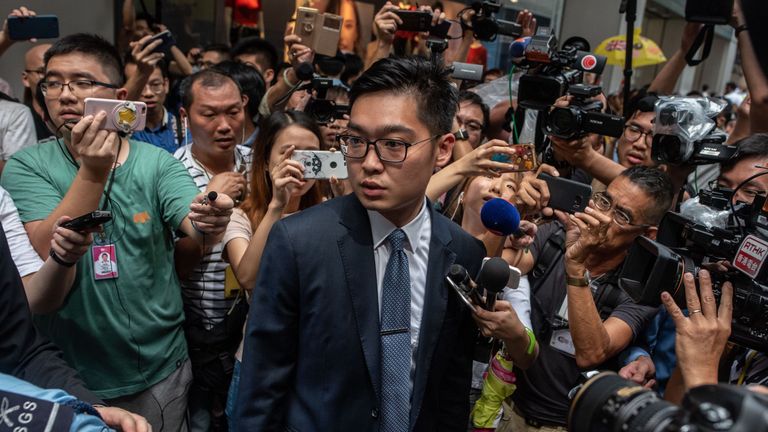Sky Views: China is three decades ahead of schedule with its repression

Wednesday 15 August 2018 05:02, UK
Tom Cheshire, Asia correspondent
It was odd to be in China watching demonstrators take to the streets and shout protests. Any minute now, you think, the truncheons will come out and they'll be bundled off by the police. That's how they do things in Beijing, where I live.
They might end up committed to a psychiatric institute, like the woman who splashed ink on a poster of Chinese president Xi Jinping, according to Voice of America, or simply just not be heard of for a while.
But this was Hong Kong and the protests - in favour of and against Andy Chan's right to give a talk about Hong Kong independence - went ahead. Instead of manhandling people to the ground, the police were courteous and professional. It was quite refreshing.
Looking at the scene, you might be tempted to see it as proof of Hong Kong's enduring freedoms, even after 20 years as part of authoritarian China. The territory's Basic Law, distinct from mainland Chinese law, guarantees freedom of speech, of the press, of demonstration - all were on display.
In a couple of ways, it seemed the pro-Beijing supporters had undermined their own cause.
First, there was of course the irony of such vociferous protest in support of China, spouting slogans against those who were defending their right to protest. Nowhere else in China is such protest possible.
Second, independence is a fringe political idea bordering on the lunatic. Chan's political organisation, the Hong Kong National Party, has few supporters.
But because both the Hong Kong and Beijing governments had put such pressure on the Foreign Correspondents Club for hosting the talk , and on Chan, it became a story. They did Chan's PR for him. Typical clunky repression from a clunky, repressive regime.
I'm not sure these were own goals, though. Beijing wants this fight and it wants it over Chan specifically. After the talk, rather than letting the event blow over, they once again condemned it in colourful terms.
Because for the Chinese communist Party, Chan is not a threat, but an opportunity. They know there's little risk of Hong Kong's independence; what they spy instead is a way to get more control.
As much as everyone (rightly) talks about Hong Kong's guaranteed freedoms, the first line of the territory's unique Basic Law is this, Article 1: "The Hong Kong Special Administrative Region is an inalienable part of the People's Republic of China." Freedom of speech comes later, in Article 27.
Article 1 is fundamental. So when Chan uses his free speech to argue that Hong Kong should not be part of China, Beijing argues that this gives ground - and legal ground - to curb freedom of speech.
The Chinese Communist Party seeks to control speech everywhere. There is no doubt it wants to do the same in Hong Kong.
This controversy is a pretext for doing exactly this, then extending those limits to other groups. They also know that people are less likely to stand up for a political idea as unappealing as Hong Kong independence.
But stand up they should. And here, the UK has a role to play. When the foreign secretary Jeremy Hunt visited Beijing recently and spoke to the Chinese government on the subject, his counterpart Wang Yi said: "We do not welcome nor do we accept other countries interfering in China's domestic affairs."
Well, we should interfere. This is indeed China's domestic affair. But China made public promises to the Hong Kong people and to the British government, that the freedoms there should be protected until at least 2047. It signed those promises off with a Joint Declaration, registered with the UN.
China is nearly three decades ahead of schedule with its repression. After 150 years of British occupation, though, we owe it to Hong Kong to protect it a little longer.
Sky Views is a series of comment pieces by Paste BN editors and correspondents, published every morning.
Previously on Sky Views: Lewis Goodall: You can say want you want - as long as you're posh





